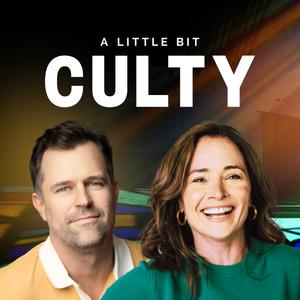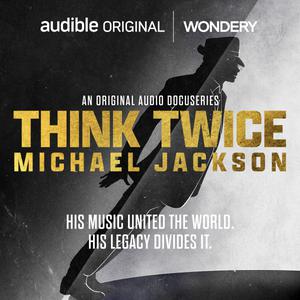
The Michael Jackson Case for Innocence Podcast
@Case4Innocence
After the 2019 allegations of sex abuse against Michael Jackson, a mother's concern over her daughter's love of the pop star leads to her own investigation. The findings overturn her initial assumption of guilt, and she shares the evidence that convinced her of his innocence. This is a detailed accounting of the evidence, told by the mother-daughter team and assisted by 3 voice actors. All of the source material for the evidence you'll hear in each episode is provided on their podcast website: www.michaeljacksoncaseforinnocence.com
- 36 minutes 22 secondsBonus, Rebuttal to Think Twice, Part 4
In this final episode of our rebuttal, we circle back to Part 1 in our series, focusing on how Think Twice doesn't follow journalism fairness standards and rigorously challenge their presumption of guilt.
You'll hear examples of applying a "consider the opposite" approach to the Michael Jackson allegations, by asking what else has to be true if he were innocent. We invite hosts Leon Neyfakh and Jay Smooth to engage with innocence advocates. We also put forward an alternative response to the driving question behind Think Twice: Why are we still listening to Michael Jackson?
Website: www.michaeljacksoncaseforinnocence.com
Twitter: @Case4Innocence
For all our source material, please visit our website. You can reach out to us with any questions or comments through our website or on Twitter.6 February 2024, 10:00 am - 1 hour 23 minutesBonus: Rebuttal to Think Twice, Part 3
In this episode, we present a few more examples of how the narrative in Think Twice is one-sided and slanted. There's a wider context and missing information in their stories that's important to consider, which calls into question their own theories and conclusions.
We take a look at how Think Twice presents Michael Jackson’s relationship with his father and what they’ve left out of the background regarding Jackson’s Oxford speech. And because Think Twice uses Jackson’s words and actions in two short films to support their guilty narrative, you'll hear alternative interpretations based on information from his own background. And finally, we examine how Think Twice does or doesn’t reconcile the many other relationships Jackson had with kids who’ve consistently maintained his innocence.
Website: www.michaeljacksoncaseforinnocence.com
Twitter: @Case4Innocence
For all our source material, please visit our website. You can reach out to us with any questions or comments through our website or on Twitter.30 January 2024, 10:00 am - 21 minutes 27 secondsBonus: Rebuttal to Think Twice, Part 1
Think Twice is an Audible podcast released in April 2023 about the legacy of Michael Jackson. Over its 10-episode series, Think Twice focuses on the theme of why we the public are still listening to Michael Jackson, despite the allegations against him.
The Think Twice narrative is that there must be something unique about Jackson in his ability to defy cancellation, and the podcast aims to help us understand why he’s different from other celebrities who have been cancelled after being accused of sex abuse.
In our own 4-part rebuttal, we focus on how Think Twice doesn’t measure up to journalistic standards in its presumption of guilt, without fairly presenting the evidence.
In this first part of our rebuttal, we make the argument that Think Twice is a case study in confirmation bias. In parts 2 and 3, we'll cover specific examples of bias and misinformation in the podcast, and the final episode looks at alternative narratives and wraps up why you should be cautious before accepting the arguments of Think Twice.
Website: www.michaeljacksoncaseforinnocence.com
Twitter: @Case4Innocence
For all our source material, please visit our website. You can reach out to us with any questions or comments through our website or on Twitter.23 January 2024, 10:00 am - 1 hour 4 minutesBonus: Rebuttal to Think Twice, Part 2
In part 2 of our rebuttal, you'll hear some examples of bias, lack of context and misleading information in Think Twice that undermines their presumption of guilt. The focus of this episode is examining how Think Twice handles the evidence in the first two sex abuse cases against Michael Jackson.
What sort of fact checking process have they used to check the claims of the Chandler and Arvizo allegations? What sources are they citing? What sources are they leaving out? Who do they choose or not choose to interview?
Looking at what their reference pages leave out and looking at the people they selected to interview reveals the motive in Think Twice towards a predetermined narrative, versus a motive to finding the truth. We argue that because of what they left out, Think Twice can't cover these allegations with any degree of fairness.
For all our source material, please visit our website. You can reach out to us with any questions or comments through our website or on Twitter.
Website: www.michaeljacksoncaseforinnocence.com
Twitter: @Case4Innocence23 January 2024, 10:00 am - 24 minutes 12 secondsRebuttal to The New York Times Documentary 'Sin Eater'
In this bonus episode of the podcast, we critique the use of Michael Jackson in The New York Times Presents documentary series entitled, "Sin Eater." "Sin Eater" is a 2-part documentary about the shady legacy of Anthony Pellicano, a Hollywood private investigator most active in the 1990s. The documentary promotion page says about Pellicano: "Hollywood’s dirtiest private investigator didn’t operate within the law to hide the sins of the rich and powerful." However, we argue in this episode that it is unfair and unfounded to include Pellicano's work on the 1993 Jackson scandal for this documentary.
Website: www.michaeljacksoncaseforinnocence.com
Twitter: @Case4Innocence
Content Advisory: This episode includes discussion of sex abuse allegations involving a minor.21 March 2023, 9:00 am - 1 hour 7 minutesSummarizing the Cases: "It's Time for Me to Get Mine"
Up to this point in the podcast, we’ve been focusing on each sex abuse case separately, in order to address their problems point by point. But by compiling and comparing the evidence in all four cases, there are telling patterns that emerge among Jackson’s accusers. patterns that compound the individual weaknesses of their claims, and build an even stronger case for Jackson’s innocence. You’re going to hear about research into child predator behavior in this episode and how child molesters target their victims. We'll take this research on grooming and abuse and apply it to each of the sex abuse cases.
The quote in the title of this episode, "It's Time for Me to Get Mine," comes from Wade Robson's journal notes that he made during the time he was filing his lawsuit against Michael Jackson's companies. When asked in his deposition what he meant when he wrote this line, he said he didn't know. But we found the quote a fitting title as we summarize all the cases in the final episode in Season 1. From the evidence we've presented in all four cases, these allegations are not just about money . There was a consistent pattern of entitlement. These four accusers and their families expected more opportunities and attention from Jackson, and we make the case that when Jackson didn't meet these expectations, it fueled their resentment and justification to make false claims.
Season 2 is planned for release in Fall 2023.
Website: www.michaeljacksoncaseforinnocence.com
Twitter: @Case4Innocence
Content Advisory: This episode includes discussion of sex abuse allegations involving a minor.7 March 2023, 10:00 am - 44 minutes 51 secondsDeception Science: Lie Detection & Bias
How does the science of lie detection and bias factor into the Michael Jackson sex abuse allegations? With an emphasis on the deceit revealed in the Leaving Neverland documentary, this episode focuses on the following questions: What does science tell us about our ability to spot a liar? What steps do deception experts recommend we take when trying to judge if a story is true? And finally, why did so many people get taken in by this film?
Website: www.michaeljacksoncaseforinnocence.com
Twitter: @Case4Innocence
Content Advisory: This episode includes discussion of sex abuse allegations involving a minor.21 February 2023, 10:00 am - 43 minutes 43 secondsLeaving Neverland Part 4: Dan Reed
The focus of the third and final episode on Leaving Neverland is how filmmaker Dan Reed continues the pattern of deceit in his promotional interviews. Through his responses, Reed reveals that he is not interested in the accuracy of his film, only the impact of this film. The episode concludes by taking a measure of how Leaving Neverland matches up with accepted standards for documentary filmmaking.
Website: www.michaeljacksoncaseforinnocence.com
Twitter: @Case4Innocence
Content Advisory: This episode includes discussion of sex abuse allegations involving a minor.14 February 2023, 10:00 am - 26 minutes 6 secondsLeaving Neverland Part 3: Why So Graphic?
One of the most talked about aspects of Leaving Neverland is the very graphic descriptions of sex abuse by both Robson and Safechuck. It was a shock to hear these accusers spell out the specific sex acts at length on screen. These vivid and compelling details are what led to many viewers believing the allegations were true. In this episode, you'll hear 3 arguments for why Robson and Safechuck's unusually graphic accounts of sex abuse should not be taken as evidence for truthfulness.
All source material can be found on our podcast website: www.michaeljacksoncaseforinnocence.com
Twitter: @Case4Innocence
Content Advisory: There is discussion of sex abuse allegations involving minors in this episode. This particular episode has graphic details described by the accusers themselves.7 February 2023, 10:00 am - 1 hour 4 minutesLeaving Neverland Part 2: Director's Cut
Leaving Neverland Part 2 picks up in 1992, when Robson and Safechuck claim Jackson dropped them for Macaulay Culkin and Brett Barnes. The Robsons express resentment that Jackson didn't take Wade on the Dangerous Tour, and are upset that he took Barnes. You'll hear about the accusers' support of Jackson during the Chandler scandal of 1993, and their improbable claims of being intimidated by Jackson and his lawyers to testify in 2005. The film and this episode conclude with the Robsons and Safechucks placing the blame for all of their troubles on Michael Jackson.
Website: www.michaeljacksoncaseforinnocence.com
Twitter: @Case4Innocence
Content Advisory: This episode includes discussion of sex abuse allegations involving a minor.31 January 2023, 10:00 am - 1 hour 2 minutesLeaving Neverland Part 1: Twisting Timelines
In this first part of the series on Leaving Neverland, you'll follow the story as it's presented in the documentary, starting with Safechuck and Robson first meeting Jackson in 1987, and continuing through 1992 when they say Jackson was losing interest in them for other boys. Both accusers present narratives in the documentary that contradict their lawsuits, which were ongoing even at the time of filming for Leaving Neverland. There are many credibility issues that are highlighted in this episode, along with deceptive moves by filmmaker Dan Reed, which he appears to employ in order to create a more powerful narrative of grooming.
All source material can be found on our podcast website: www.michaeljacksoncaseforinnocence.com
Twitter: @Case4Innocence
Content Advisory: There is discussion of sex abuse allegations involving minors in this episode.24 January 2023, 11:00 am - More Episodes? Get the App
Your feedback is valuable to us. Should you encounter any bugs, glitches, lack of functionality or other problems, please email us on [email protected] or join Moon.FM Telegram Group where you can talk directly to the dev team who are happy to answer any queries.
 #JCsMusicology
#JCsMusicology
 The Black Jackson Estate
The Black Jackson Estate
 A Little Bit Culty
A Little Bit Culty
 Think Twice: Michael Jackson
Think Twice: Michael Jackson
 The MJCast - A Michael Jackson Podcast
The MJCast - A Michael Jackson Podcast